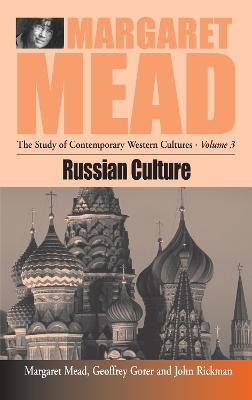Margaret Mead: The Study of Contemporary Western Culture
3 primary works • 4 total works
Book 1
The United States on the eve of the Second World War was still a society largely isolated from the world. Facing enemies with unfamiliar cultural traditions, the U.S. government turned to anthropologists for insight. The result was a research effort that continued long after the war, aimed, in the words of Margaret Mead, at analyzing the cultural regularities in the characters of individuals who are members of societies that are inaccessible to direct observation. In 1953, Margaret Mead and Rhoda Métraux produced The Study of Culture at a Distance, a compilation of research from this period. This remarkable work, long unavailable, presents a rich and complex methodology for the study of cultures through literature, film, informant interviews, focus groups, and projective techniques. The book also provides fascinating insights into such diverse cultures as China, Thailand, Italy, Syria, France, Germany, Russia, Romania, and Great Britain, and includes some highly original analysis such as that of the Soviet style of chess, a study of Jean Cocteau's classic film La Belle et la Bête, and the cultural interpretations of Rorschach tests administered to Chinese subjects.
Book 2
Margaret Mead wrote this comprehensive sketch of the culture of the United States - the first since de Tocqueville - in 1942 at the beginnning of the Second World War, when Americans were confronted by foreign powers from both Europe and Asia in a particularly challenging manner. Mead's work became an instant classic. It was required reading for anthropology students for nearly two decades, and was widely translated. It was revised and expanded in 1965 for a second generation of readers. Among the more controversial conclusions of her analysis are the denial of class as a motivating force in American culture, and her contention that culture is the primary determinant for individual character formation. Her process remains lucid, vivid, and arresting. As a classic study of a complex western society, it remains a monument to anthropological analysis.
Book 4
Margaret Mead collaborated with her long-time colleague Rhoda Métraux in this unique study of French culture. The Hoover Institute at Stanford University originally published this volume, which grew out of the Columbia University project on Research of Contemporary Cultures in 1954. It is one of the few works by American social scientists dealing with broad themes of French life.
Mead and Métraux present a vivid picture of the French starting with the organization of the house and its architecture, and drawing original conclusions for the structure of French families and overall cultural values. This work, long out of print, is a fascinating and penetrating portrait of a contemporary European society.
This volume brings together two classic works on the culture of the Russian people which have been long out of print. Gorer's Great Russian Culture and Mead's Soviet Attitudes towards Authority: An Interdisciplinary Approach to Problems of Soviet Character were among the first attempts by anthropologists to analyze Russian society.
They were influential both for several generations of anthropologists and in shaping American governmental attitudes toward the Soviet Union during the Cold War period. Additionally they offer fascinating insights into the early anthropological use of psychological data to analyze cultural patterns. Read as part of the history of the anthropology of complex contemporary societies, they are as fascinating for their more questionable conclusions as for their accurate characterizations of Russian life.



